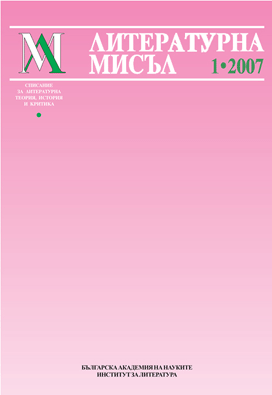Канонизация чрез съперничество: Случаят Григор Пърличев
Canonization through Competition: The Case of Grigor Părličev
Author(s): Raymond DetrezSubject(s): Literary Texts
Published by: Институт за литература - БАН
Keywords: National Literary canon; Grigor Părličev and the Greek/Bulgarian/Macedonian canon; literary history
Summary/Abstract: The normal criteria for an author to be included in a national literary canon are that s/he should belong to the nation to which the canon is related, that s/he must write in the nation’s (standard) language, and that her/his work is of reasonable size and aesthetic value. A criterion of secondary importance, valid in societies marked by nationalism, may also contribute to an author’s canonization: the “national” character of her/his work in the sense that it deals with national themes, displays the national identity, or attests to the author’s devotion to the national cause — a devotion preferably supported by her/his real-life heroism or martyrdom. Părličev’s canonization has proven to be problematic in all respects. To which nation did he actually belong? In his youth he had no well-defined sense of national identity and probably considered himself a “Greek” in the sense of being an Orthodox Christian. As an adult he explicitly identified himself with the Greek and later with the Bulgarian nation. In the later decades of his life, he seemed to have been inclined to adhere to some form of vague Ohrid or Macedonian particularism, though apparently continuing to perceive himself as a Bulgarian. Given this evolution, it is understandable that Părličev’s national identity grew into a sensitive issue in the framework of discussions about the existence of a Macedonian nation between Bulgarian and Macedonian (literary) historians. Much has been done by Bulgarian and Macedonian post-war scholars to promote Părličev as one of the pivotal figures in their respective 19thcentury histories. This article explores some of the strategies applied by Bulgarian and Macedonian literary historians in order to include Părličev in their respective national canons and to give him a more prominent place on the ranking list of national writers. The motivation for canonizing Părličev proves to have always been political. He served Greek national ambitions when he was given the first prize at the Athenian Poetry Contest in 1860; he served Bulgarian national ambitions, especially after World War II when Bulgarian scholars promoted him as a top class Bulgarian author from Ohrid; and in post-war Yugoslav Macedonia he was out of the blue and unreservedly proclaimed the most important 19thcentury Macedonian author, as if his Macedonian national identity was unequivocal.
Journal: Литературна мисъл
- Issue Year: 2007
- Issue No: 1
- Page Range: 61-101
- Page Count: 41
- Language: Bulgarian
- Content File-PDF

